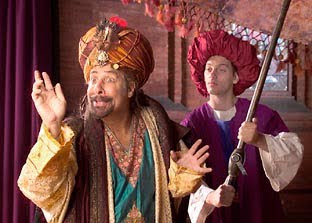Mufti

Pat from Elk Rapids asked about the phrase dressed in mufti. It refers to plain or civilian clothes worn by a person who normally wears a uniform, and it seems to have developed in two stages.
The original mufti was a Muslim cleric or scholar who was extremely well-versed in Islamic law. Having achieved that status, he was empowered to issue opinions on religious matters and could declare fatwas, rulings about beliefs. Mufti, in fact, could be translated as “to decide by legal opinion.”
In the 18th century, oriental themes and the Near East were all the rage with French writers, and the preoccupation influenced British writers, too. We would now consider a novel such as William Beckford’s The History of the Caliph Vathek to be bizarre beyond belief, but the reading public of that day loved it. Translations of The Thousand and One Nights probably precipitated the trend.
Such themes also appeared in plays, and a stereotype of muftis developed: turban, flowing garments, pointed shoes. The Oxford English Dictionary thinks that such an outfit bore at least a passing resemblance to an officer’s off-duty clothing: dressing gown, tasseled smoking cap, and slippers. Thus, dressed in mufti became a humorous reference to the stage character.
York Theatre Company (Lexington & 54th Street) has a Musicals in Mufti series, offering lesser-known or underexposed musicals in intimate concert reading. The shows are done in street clothes without costumes and with script in hand.
SIDEBAR: Musicals in Mufti
Available from McFarland & Co.: Word Parts Dictionary, 2nd edition
Check out Mike's program-based books here:
or at Amazon.com
Listen to Mike’s program in real time every Tuesday morning, 9:00 - 10:00 a.m. EST, by going to wtcmradio.com and clicking on Listen Now.
There is a collection of podcasts. Go to wtcmradio.com and click on Podcasts. Scroll down The Ron Jolly Show to find the Words to the Wise audio button.
Visit the Senior Corner at http://seniors.tcnet.org


Comments